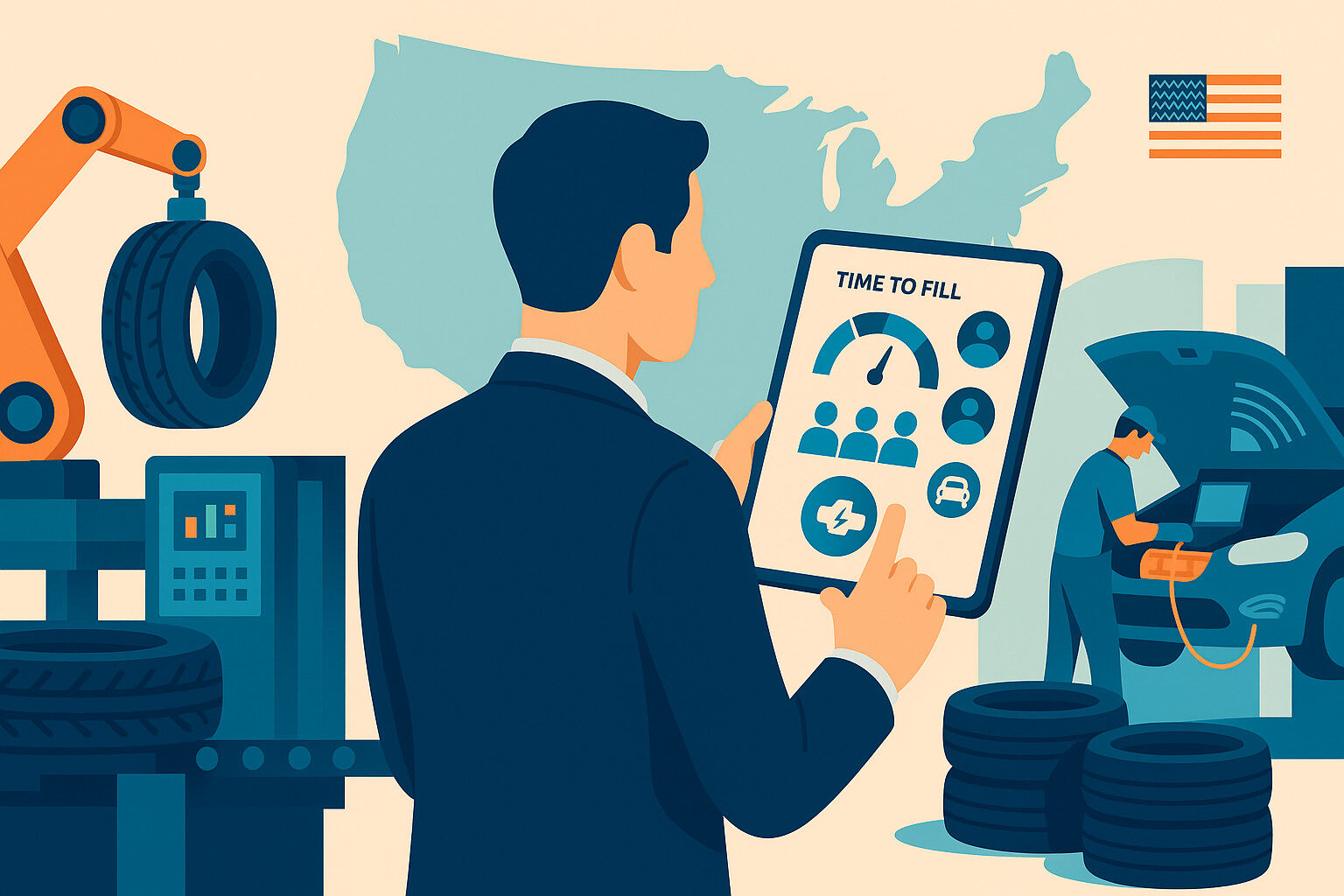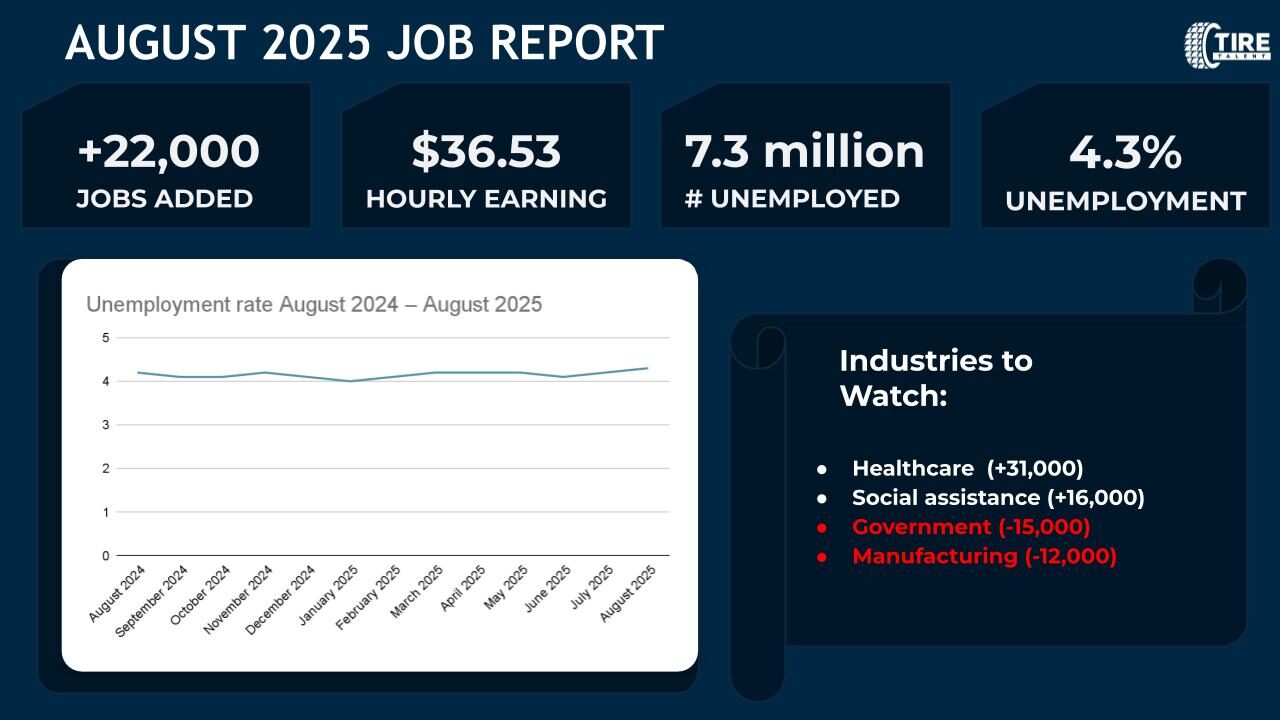By Mike Cioffi
Introduction
The tire industry is no stranger to tough conditions and I’m not just talking about the weather. From labor shortages to economic slowdowns, the pressure is on. One issue that we all know hasn’t gone away is the shortage of qualified tire technicians. It’s not just a staffing problem, it’s an industry-wide challenge that impacts everything from safety to service quality. In this blog, I’m sharing insights from my recent conversation with Kevin Rohlwing, Chief Technical Officer at the Tire Industry Association, on what’s really going on behind the scenes, how dealers are responding, and why the future of our workforce is a conversation we can’t afford to ignore.
Hiring in the Tire Industry: A Mixed Landscape
Economic indicators are flashing yellow. According to the latest BLS report, the U.S. economy added just 99,000 jobs in June, falling short of expectations and marking one of the weakest gains in the past year. At Tire Talent, we’ve seen a 48% decline in new job orders year-to-date. That’s not a blip, it’s a clear signal of caution from employers.
Kevin helped break it down: commercial and passenger sectors are behaving differently. While summer typically brings a bump in commercial business, even that’s under pressure due to a broader construction slowdown. Across the board, companies are leaning out running equipment longer, watching hours more closely, and hesitating on expansion. The tire industry’s not immune to the uncertainty clouding the broader economy.
But there’s one constant: tires wear out. Freight still moves, garbage still gets picked up, and groceries still get delivered. That means we still need technicians to keep things rolling. What’s changed is how picky companies have to be. They’re still hiring just not in bulk. They’re waiting for the right person, not just anyone who can hold a wrench.
The Technician Shortage: Why It’s Not Just a Numbers Game
We hear it every day: “There just aren’t enough good techs.” Kevin nailed it and I couldn’t agree more. The issue isn’t just about quantity, it’s about quality. This is a tough job. You’re cold when it’s cold, hot when it’s hot, and when something breaks, it’s rarely in a convenient location. It’s hard work, plain and simple.
Add to that a generation of young people who grew up hearing “go to college, get a desk job” and the result is predictable. We gutted vocational programs in high schools, and now we’re wondering why no one wants to turn a wrench.
Yet there’s opportunity. AI isn’t changing a truck tire anytime soon. The trades are one of the few industries safe from digital disruption. But for the younger generations, Millennials and Gen Z especially, they need to see the path. They need to see how starting as a tech can lead to a management role, ownership, or even their own shop. Without that vision, we lose them to other industries that promise faster gratification.
A Generational Bottleneck
There’s another layer to this issue: generational gridlock. Boomers are delaying retirement, staying in senior roles longer than expected. And Millennials? They’re eager, but the ladder’s jammed. Companies looking to cut costs are choosing youth over experience, creating churn at the top and uncertainty at the bottom. On the earthmover side, the average tech is in his 50s. That’s not sustainable. When these guys retire, who replaces them? The skills gap is real, and it’s growing.
Still, there’s hope. I know some solid younger techs who show up, care about their work, and want to get better. But they’re the exception, not the rule. And they need mentorship. They need leaders who’ll teach, not just direct. Otherwise, we risk burning out the few good ones we have.
Skills Economy vs. Soft Skills Hype
We’re in a skills economy. Period. If you can align a car, rebuild a caliper, or run a service truck on a cold night, you’re valuable. Soft skills are great, but they don’t keep freight moving. Kevin said it best: “If you have skills, you’re employable.” The tire industry doesn’t care if you’re good with spreadsheets. Can you get the job done, safely and reliably? That’s the currency here.
That said, the industry needs to market that better. We need to show that this isn’t just a job, it can be a career. And we need to do that in a way that resonates with a generation raised on social media and immediate results. That means showing the growth path clearly, creating mentorship opportunities, and emphasizing the value of real, tangible skills.
Where Do We Go From Here?
The takeaway is clear: the tire technician shortage isn’t just a hiring issue, it’s a visibility issue, a training issue, and a generational leadership issue. We need to restore the pipeline and help people see a future in this industry. That means investing in vocational training, modernizing the way we recruit, and making sure the next generation sees more than just grease and grime.
Attracting Tire Techs in 2025: There’s No Magic Bullet
Let’s be honest there’s no secret weapon when it comes to attracting tire techs. This is tough work, and it takes a certain kind of person to thrive in it. It’s physical, it’s dirty, and it’s often thankless. But that’s also what makes it one of the most honest, vital roles in our economy. So how do we find more of these people? How do we get them to look at our industry and say, “I want in”?
It starts with telling the truth and then telling the whole story.
The truth is this: tire tech work is demanding. But it’s also durable. It’s a job that can’t be offshored or automated. You can’t ChatGPT your way through mounting a 22.5-inch truck tire in the middle of a snowstorm. It’s hands-on, high-stakes, and essential to keeping supply chains moving.
Build the Bridge: Career Path Visibility
What we need to do better as an industry is show the ladder. Not everyone wants to be a tech forever. But what if they saw that starting in a bay could lead to a foreman role, then to service manager, and eventually to operations or even business ownership?
The stories are out there. I’ve talked to dozens of shop owners who started as techs. But those stories don’t get the spotlight they deserve. We need to showcase these real-life success paths across social media, career fairs, and digital platforms where younger talent is spending their time.
Partnering with Purpose: The Mike Rowe Foundation
Organizations like the Mike Rowe Works Foundation have been doing this kind of storytelling and funding for years. Mike’s message is simple: “Work hard. Show up. Learn a trade.” Through scholarships like the Work Ethic Scholarship Program, they’re helping thousands of people access training and job opportunities in the trades.
Our industry needs to lean into partnerships like this. Whether it’s co-sponsoring scholarships, amplifying their content, or aligning hiring efforts with their alumni, there’s potential here to bring in driven individuals who already want to work with their hands. It’s not just about awareness, it’s about alignment.
TIA: More Than Just Advocacy
The Tire Industry Association (TIA) is playing a critical role here and we should all know about it. Their Automotive Tire Service (ATS) and Commercial Tire Service (CTS) programs are gold standards for training. These aren’t just check-the-box classes. These are comprehensive, safety-first programs that give techs the confidence and competence they need to perform at the highest level.
TIA also advocates on Capitol Hill, pushing for regulatory awareness and trade school investment. But they can’t do it alone. Shops and dealers need to support these initiatives with dollars, awareness, and participation.
Final Thought
If you’re reading this and you’re a shop owner, a tire dealer, or someone who works in the industry this is your call to action. We’re not just competing for techs against each other anymore. We’re competing against Amazon warehouses, HVAC apprenticeships, and other trade sectors that have done a better job marketing themselves.
We need to win hearts and minds by being real, showing long-term potential, and backing it all up with training and mentorship. That’s the formula. It’s not easy, and it’s not quick but it’s worth it.
Because without tire techs, the whole industry stops moving.
Mike Cioffi is the founder of Tire Talent, a boutique recruiting agency dedicated to our industry. You can reach him directly: mike@tiretalent.com if you have any questions about this article.




